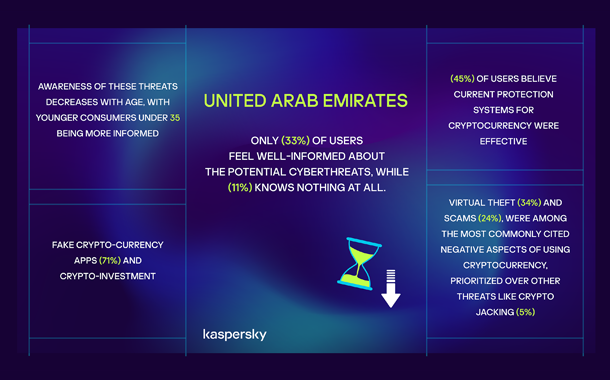Kaspersky has explored cryptocurrency user trends, finding that just 33% of respondents felt well informed about potential cryptocurrency cyberthreats, while 11% had no information at all. In a survey, Kaspersky also discovered that half of the respondents had been affected by cryptocurrency crime in some way, with 55% of crypto owners did not believe current protection systems for cryptocurrency were effective. These and other findings are in Kaspersky’s new report.
Are users familiar with cryptocurrency threats?
According to the recent survey, a significant proportion of individuals are unaware of the potential threats faced by cryptocurrency owners. Despite the increasing popularity of cryptocurrency, only 33% of respondents felt extremely or very well informed about the potential risks of using it, while 11% had no information at all. Moreover, awareness of these threats decreases with age, with younger consumers under 35 being more informed.
Cyber threats, such as virtual theft and scams, were among the most commonly cited negative aspects of using cryptocurrency, with 34% and 24% of respondents in the UAE respectively highlighting them as their top concerns. While 36% of respondents were unaware they could become a target of crypto threats – even if they do not own cryptocurrency. It is worth noting that anyone can become a target for cryptominers – programs that secretly generate cryptocurrency for their owners using the resources of other computers, whether they own cryptocurrency or not.
Threats concerns vary by region
The major concerns in the United Arab Emirates and Saudi Arabia are crypto-investment fraud (70% and 73%, respectively), and fake crypto-currency apps in the UAE at (71%), as well as fake crypto-exchanges (86%) in Saudi Arabia.
Does cryptocurrency need more protection?
More than half (70%) of all respondents had been affected by cryptocurrency crime in some way, revealing the wide range of criminal activities in the field. Additionally, 55% of surveyed individuals did not believe that current protection systems for cryptocurrency were effective, with 41% of current crypto owners in the UAE not believing existing protection systems to be sufficient.
“Despite the recent cryptocurrency market downturn, the level of malicious activity in the field has not decreased. The crypto industry, still in its infancy, remains a prime target for fraudsters. This survey emphasizes the need for increased awareness and education about the potential risks faced by cryptocurrency owners. As the adoption of digital assets continues to grow, it is essential for individuals to take appropriate measures to protect themselves from cyber threats,” comments Vitaly Kamluk, the head of APAC unit, Kaspersky’s Global Research & Analysis Team.

















